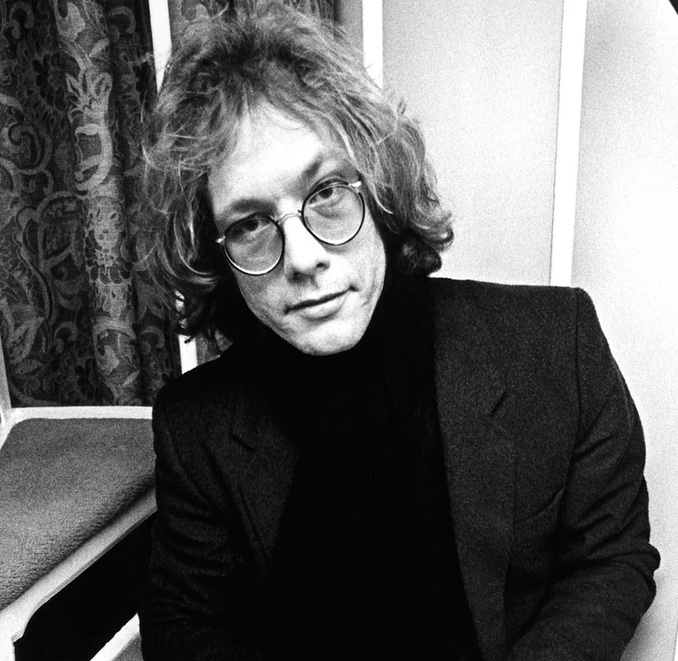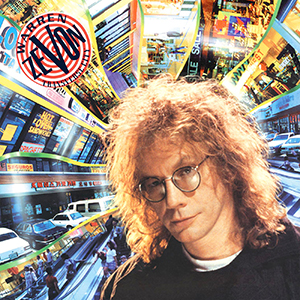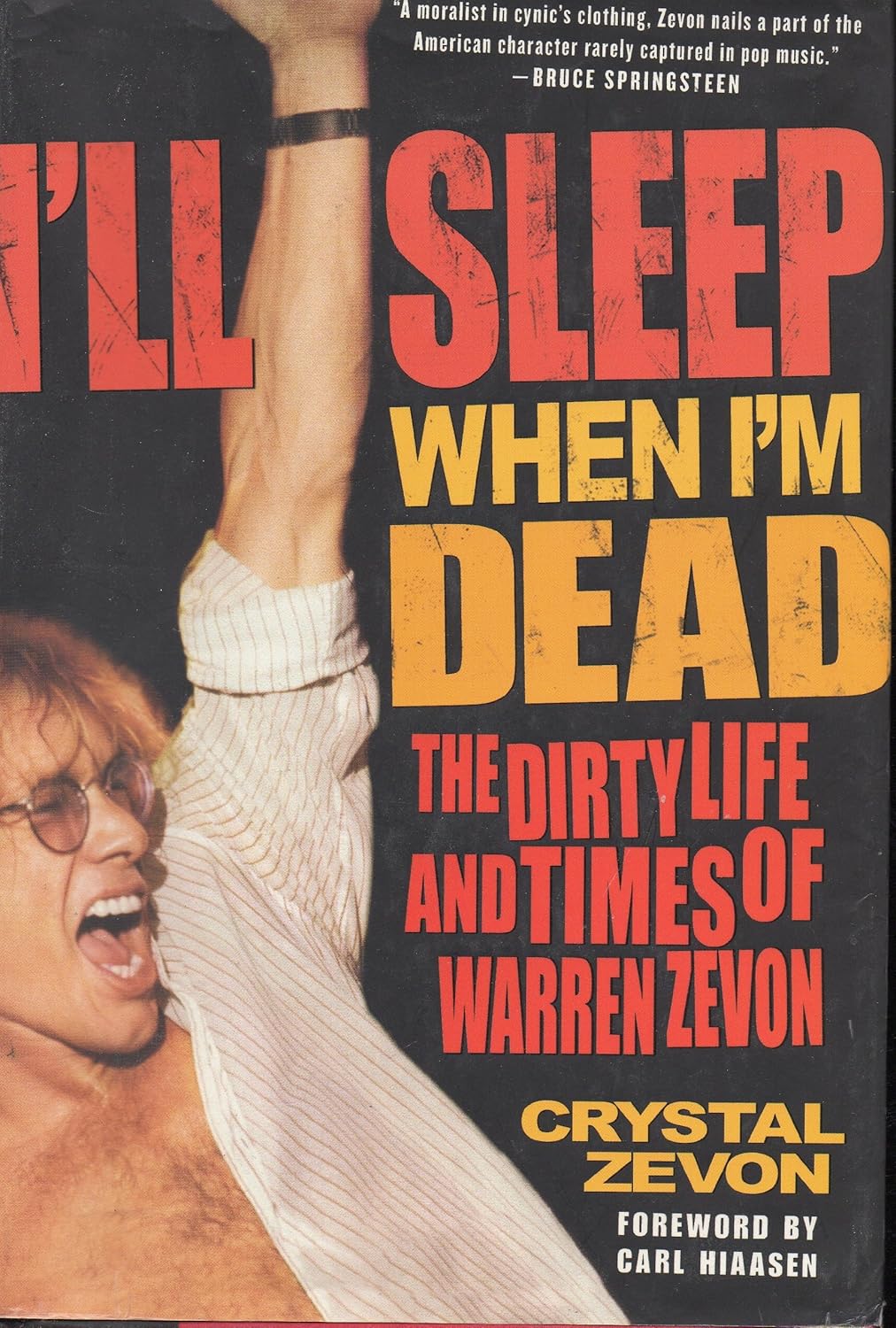Pynchon Music: Warren Zevon
Thinking About Entropy
Nothing tells a man he’s about to die like when Bob Dylan starts doing your music.
—Warren Zevon, 2002
Warren Zevon (1947–2003)
We’re not going to pretend that Warren Zevon was a normal guy. His biography reads like a character from one of Pynchon’s wackier scenarios: Born in Chicago to a Mormon mother and Mickey Cohen’s favorite bookie, one William “Stumpy Zevon” Zivotovsky, young Warren grew up in Fresno, where he sipped scotch and played piano with Igor Stravinsky. After his parents split up, Warren dropped out of high school and fled to New York City to pursue a musical career. Starting off as a folkster, he wrote jingles, played piano in Spain for a spell, toured with the Everly Brothers, and roomed with famously-stable couple Stevie Nicks and Lindsay Graham. You know, pretty typical stuff; you remember your early twenties, right?
Falling under the spell of the notoriously shady producer (and hypophone artist) Kim Vincent Fowley, Warren Zevon produced his first album in 1969, the lackluster Wanted Dead or Alive. Released to “the sound of one hand clapping,” the album failed miserably. Zevon moved on, severing his relationship with Fowley and waiting seven years to reboot his recording career. Effectively erasing his first album with the self-titled Warren Zevon, the record was produced by Jackson Browne, who’d become Zevon’s lifelong friend and champion. A country-rock paean to beautiful losers and broken rebels, Warren Zevon contained all the elements that would come to characterize his musical oeuvre: brutal honesty, flinty pride, and a dark sense of humor. It also contained one of his most-quoted song titles, “I’ll Sleep When I’m Dead.” But it was his third LP, Excitable Boy, that catapulted Warren Zevon to success with its two most enduring tracks, “Werewolves of London” and “Lawyers, Guns, and Money.”
Unfortunately, success conjured demons of its own. Already a heavy drinker, Zevon began spiraling out of control, his newfound fame exacerbating all his bad habits. There was the booze and drugs, the feckless womanizing, the blackout domestic abuse against his suffering wife, Crystal. There were creative problems as well. Zevon found himself struggling against a label and fanbase which expected an endless string of hits like “Werewolves.” One drunken night in the studio, Zevon drew a gun and unloaded three rounds into the Excitable Boy album cover. As the cover consists solely of Zevon’s face, glancing at the camera with an inscrutable half-smile on his lips, the symbolism of his outburst needs no explanation. When his shocked wife arrived to investigate, Zevon just shrugged: “It’s funny, isn’t it?”
Uninterested in repeating himself, Zevon continued to release whatever the hell he wanted to release; albums marked by his cynical worldview and mordant sense of humor. (Somehow pop fans overlooked that Excitable Boy featured three consecutive songs where people get horribly mutilated.) His record sales tanked, he got divorced from Crystal, and he burned bridges and friendships alike. Finally in 1984, Zevon checked himself into rehab.
After some time finding sobriety and clearing his head, Zevon returned to the music scene. He began working with Peter Buck, Mike Mills, and Bill Berry of R.E.M. His “comeback” album arrived in 1987 with Sentimental Hygiene. It featured members of R.E.M., along with a wildly eclectic roster of musical guests ranging from George Clinton to Bob Dylan. Zevon found himself back in the limelight, his association with college-rock darlings R.E.M. exposing him to a new generation of fans.
Of course Warren Zevon will be Warren Zevon, and he followed up the success of Sentimental Hygiene with a bizarre homage to cyberpunk, a concept album inspired by William Gibson and Thomas Pynchon. Released in 1989, Transverse City presented the public with a bleak, pessimistic tale of environmental catastrophe, rampant consumerism, and civic apathy—just what AOR stations wanted! Despite boasting yet another jaw-dropping cast of guest stars—Jerry Garcia, David Gilmour, Neil Young, Chick Corea; the list goes on!—the album flopped, and Virgin dropped Zevon from the label. (As one recent podcaster remarked, not without some degree of awed appreciation: “It’s like: Warren Zevon scores Solarbabies…?”)
And so began the Nineties. And while Warren Zevon never achieved the commercial success of his many friends and associates, he continued his life of offbeat friendships (Hunter S. Thompson, Billy Bob Thornton, David Letterman), unexpected side-projects (Hindu Love Gods, Rock-Bottom Remainders, William Shatner’s TekWars) and second (and third) “comebacks.” By the time the 2000s arrived, Zevon had become a cult figure; a musician’s musician, frequently covered but rarely played on the radio. Except for, you know, that song; forcing every die-hard fan to roll their eyes when the uninitiated start warbling the chorus: “You know, Warren Zevon actually has a ton of really amazing stuff…”
In 2002, Warren Zevon was diagnosed with pleural mesothelioma, a form of lung cancer sometimes triggered by exposure to asbestos. Informed that he had three months to live, Zevon began drinking again. He approached his terminal disease with the unsentimental honesty of Bill Hicks, or perhaps one of his own musical characters, even telling his manager, “I’m giving you permission to use my illness in any way that you see fit to further my career right now.” On October 30, 2002 Zevon made a famous appearance on David Letterman, serving as Dave’s sole guest and talking openly about his illness. In a later interview with Jon Pareles of the New York Times, Zevon revealed that he had made a selection for his “limited” reading time, a book familiar to fans of Gravity’s Rainbow: Rainer Maria Rilke’s Duino Elegies. Zevon explained his choice: “Rilke seems to write about a universe where everybody’s dead except for a brief shining moment when we’re not.”
On August 26, 2003, Zevon released his final album, The Wind. Twelve days later, Warren Zevon was dead. In an act of self-congratulatory hypocrisy certain to have amused the departed singer, the National Academy of Recording Arts and Sciences bestowed Warren Zevon with his first-ever Grammy nominations. Nominated for five categories, he won two: “Best Rock Performance by a Duo” and “Best Contemporary Folk Album.” True to form, Warren failed to accept his awards in person—he was sleeping.
Pynchon Connection
Warren Zevon’s copy of Vineland. Click to enlarge.
Lyrics
“Run Straight Down”
Dimethyl sulfate, chloromethyl methylether
2, 3, 7, 8-Tetrachlorodibenzo-
para-dioxin, carbon disulfide)
benzenes, 2-Nitropropane, pentachlorophenol,
Benzotrichloride, strontium chromate
1, 2-Dibromo-3-chloropropane)
Started thinking about entropy
Smelled the wind from the ruined river
Went home to watch TV
And it’s worse when I try to remember
When I think about then and now
I’d rather see it on the news at eleven
Sit back, and watch it run straight down
Run straight down
Run straight down
I can see it with my eyes closed
Run straight down
We’ve been living in the shadows all our lives
Where it’s stand in line and don’t look back
and don’t look left and don’t look right
So we hide our eyes and wonder who’ll survive
Waiting for the night…
Fluorocarbons in the ozone layer
First the water and the wildlife go
Pretty soon there’s not a creature stirring
‘Cept the robots at the dynamo
And it’s worse when I try to remember
When I think about then and now
I’d rather see it on the news at eleven
Sit back, and watch it run straight down
Run straight down
Run straight down
I can see it with my eyes closed
Run straight down
Additional Information
2. Run Straight Down (4:05)
3. The Long Arm of the Law (3:47)
4. Turbulence (4:08)
5. They Moved the Moon (4:31)
6. Splendid Isolation (4:33)
7. Networking (3:04)
8. Gridlock (4:35)
9. Down In the Mall (4:28)
10. Nobody’s In Love This Year (4:18)
Warren Zevon—vocals, guitar, harmonica, piano, keyboards, harmony.
Jorge Calderón—bass and harmony.
Rob Jaczko—percussion.
Mike Campbell—guitar and mandolin.
Jack Casady—bass.
Chick Corea—piano (3).
Jerry Garcia—guitar (1, 5).
David Gilmour—guitar (2)
Jorma Kaukonen—acoustic guitar and harmony (8).
Benmont Tench—organ (7).
Neil Young—lead guitar (8), harmony vocals (6).
Books
Offsite Links
Pynchon on Record
Return to the main music page
Last Modified: 31 August 2024
Back to: Pynchon on Record
Main Pynchon Page: Spermatikos Logos
Contact: quail(at)shipwrecklibrary(dot)com





